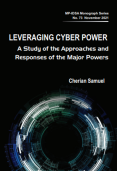India’s Cyber Security Challenge
- Publisher: Institute for Defence Studies and Analyses
This report argues that Government and the private sector give cyber security some priority in their security and risk management plans, and do this jointly. Being a report that is addressed to the security community in the widest sense and intended to stimulate public discussion, it relies on publicly available information.
- ISBN 81-86019-98-7,
- Price: ₹. 125/-
- E-copy available






